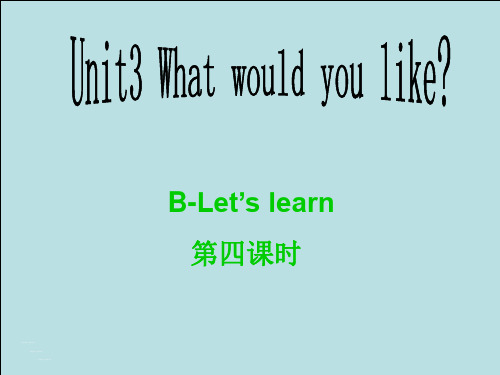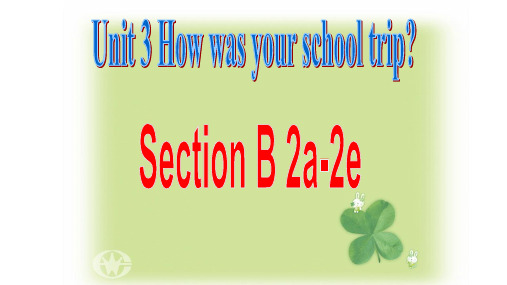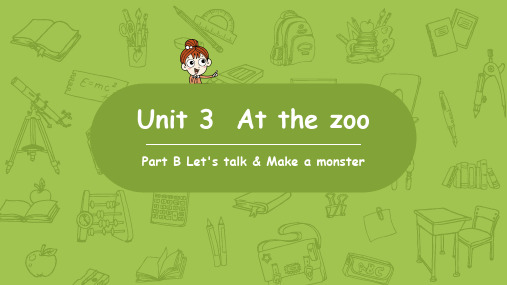unit3第四课时PPT课件
合集下载
人教版英语四年级上册Unit3 第四课时1-课件

Name Favourite food Favourite drink
Ask your friend about your favourite food and drink
Sarah’s favourite food is fish. Her favourite drink is milk.
莎拉最喜欢的食物是 鱼。她最喜欢的饮料是牛奶。
They’re delicious.
healthy
They’re healthy.
hot
They’re sweet.
绿色圃中小学教育网 绿色圃中小学教育网
sweet
They’re sweet.
绿色圃中小学教育网 绿色圃中小学教育网
Ask your fridnds about their favouritefood and drink问问你的朋友他们最喜欢的食物和饮料
绿色圃中小学教育网 绿色圃中小学教育网 绿色圃中小学教育网
B-Let’s learn 第四课时
Let’s try
Zhang Peng and Sarah are thirsty. Listen and match match.张鹏和莎拉是渴了。听并比赛 。
Let’s talk
What’s your favourite food?你最喜欢的食物是什么? Noodles.I love beef noodles. They’re delicious我喜欢牛肉面条面条。 它们是美味的 What’s your favourite food?你最喜欢的食物是什么? Fish.鱼肉 Well,Let’s see.We have beef noodles and fish sandwiches today.好 的,让我看看。今天我们吃牛肉完录音后回答下面问题:
Ask your friend about your favourite food and drink
Sarah’s favourite food is fish. Her favourite drink is milk.
莎拉最喜欢的食物是 鱼。她最喜欢的饮料是牛奶。
They’re delicious.
healthy
They’re healthy.
hot
They’re sweet.
绿色圃中小学教育网 绿色圃中小学教育网
sweet
They’re sweet.
绿色圃中小学教育网 绿色圃中小学教育网
Ask your fridnds about their favouritefood and drink问问你的朋友他们最喜欢的食物和饮料
绿色圃中小学教育网 绿色圃中小学教育网 绿色圃中小学教育网
B-Let’s learn 第四课时
Let’s try
Zhang Peng and Sarah are thirsty. Listen and match match.张鹏和莎拉是渴了。听并比赛 。
Let’s talk
What’s your favourite food?你最喜欢的食物是什么? Noodles.I love beef noodles. They’re delicious我喜欢牛肉面条面条。 它们是美味的 What’s your favourite food?你最喜欢的食物是什么? Fish.鱼肉 Well,Let’s see.We have beef noodles and fish sandwiches today.好 的,让我看看。今天我们吃牛肉完录音后回答下面问题:
鲁教版五四制英语七上Unit3 第四课时课件

Who has quick eyes?
can learn buy take are not teach see visit is get go climb
2b
Fast reading: Read and find the topic sentence of each diary.
2a
Do the following words describe good things or bad things? Put a √ for good and an X for bad. Leave a blank if they can mean both.
2b
Read Helen’s and Jim’s diary entries. Underline the positive adj and circle the negative adj.
2c
Careful reading Complete the chart. How do Helen and Jim describe these things?
2. To retell the two diary entries (复述两篇日记)。
1. 参加学校郊游 2. 参观科学博物馆 3. 看到一些农场和村 庄 4. 沿途 5. 学了关于机器人的 知识 6. 做机器人模型 7. 总而言之 8. 对…感兴趣 9. 一点也不
1. go on a school trip 2. visit the science museum 3. see some farms and villages 4. along the way 5. learn a lot about robots 6. make a model robot 7. all in all 8. be interested in 9. not … at all
精选最新四年级英语(人教版)-Unit 3 Transportation (第四课时)-PPT课件

Why does Jane go to school on foot or by car ?
四年级 英语
I am Jane. I usually go to school on foot. My mum works in a supermarket nearby. She usually goes to work by bike. My dad is not so lucky. He has a long way to go every day. He usually goes to work by car. On rainy days, my dad takes me to school in his car. How do you usually go to school?
四年级 英语
WhHyodwoeasboDuatdDgaodtaonwdoJraknbey? car?
I am Jane. I usually go to school on foot. My mum works in a supermarket nearby. She usually goes to work by bike. My dad is not so lucky. He has a long way to go every day. He usually goes to work by car. On rainy days, my dad takes me to school in his car. How do you usually go to school?
四年级 英语
Why does Dad go to work by car?
I am Jane. I usually go to school on foot. My mum works in a supermarket nearby. She usually goes to work by bike. My dad is not so lucky. He has a long way to go every day. He usually goes to work by car. On rainy days, my dad takes me to school in his car. How do you usually go to school?
人教PEP版五年级下册英语精品教学课件 Unit 3 第4课时Part B Let's learn

It's a big dinner. In the USA, people usually eat turkey on that day.What holiday is it? It's American Thanksgiving Day.
Look and say
When is _A_m_e_r_ic_a_n_T__ha_n_k_s_g_iv_in_g__D_a_y____? It's in __N_o_v_e_m_b_e_r___.
Look and say
When is _C_h_r_is_t_m_a_s_? It's in _D_e_c_e_m_b_e_r__.
圣诞节
Use the pattern to ask your partner.
0
5
25
10 20 15
开始
—When is .0.. ? —It's in...
the winter vacation the sports meet the singing contest the school trip
余的月份缩写都是前面三个字母加点,首字母仍 需大写,注意缩写形式的月份一般不能用于句中。
Homework
1.背诵并尝试默写本单元单词。 2.完成相应课时的内容。
Let's learn
When is MidAutumn Day?
It’s usually in September or October.I’ll eat mooncakes with my family.
句型结构:主语+will+ 动词原形(+其他)
描述某人将要做某事,是一般 将来时,表示将要发生的动作。
Look and say
When is _A_m_e_r_ic_a_n_T__ha_n_k_s_g_iv_in_g__D_a_y____? It's in __N_o_v_e_m_b_e_r___.
Look and say
When is _C_h_r_is_t_m_a_s_? It's in _D_e_c_e_m_b_e_r__.
圣诞节
Use the pattern to ask your partner.
0
5
25
10 20 15
开始
—When is .0.. ? —It's in...
the winter vacation the sports meet the singing contest the school trip
余的月份缩写都是前面三个字母加点,首字母仍 需大写,注意缩写形式的月份一般不能用于句中。
Homework
1.背诵并尝试默写本单元单词。 2.完成相应课时的内容。
Let's learn
When is MidAutumn Day?
It’s usually in September or October.I’ll eat mooncakes with my family.
句型结构:主语+will+ 动词原形(+其他)
描述某人将要做某事,是一般 将来时,表示将要发生的动作。
人教PEP版小学英语三年级下册 Unit 3 At the zoo 第四课时 教学课件PPT

Let's talk
Miss White, John, Mike and Chen Jie are looking at an elepahnt. Please describe this elephant.
Presentation
Listen and write
Now, listen to the dialogue. And then fill in the blanks. The elephant has a _l_o_ng__ nose. The elephant has a _s_h_o_r_t tail. The elephant has _s_m_a_l_l eyes and __b_i_g_ ears.
Unit 3 At the zoo
Part B Let's talk & Make a monster
Learning goals
Learning goals
✔ 能听、说单词:
children, tail, long, short, small, big
✔ 能够运用句型:
1. It has ... 2. It has ... and ... 3. Come here, children.
Wow! It has a big body.
It has small ears and short legs.
Presentation
Come here, children. Look at the tiger.
It has small eyes and a big mouth.
It has a long tail. It has short legs.
Presentation
新人教版七年级上册英语 Unit3 第4课时 教学课件

处、某时间或时刻)
(1) “call sb. at + 电话号码”
拨打……(号码)找某人 e.g. Call Mary at 236-0388.
请拨打236-0388找玛丽。
(2) at 表示时间,用于钟点前,用于时刻 前,译为 “在......时(刻)”。如:
第十七页,共二十二页。
新课讲解
at three/three o’clock 在三点
新课讲解
Language points 6
6. I must find it. must modal v. (情态动词)必须 e.g. You must finish it today.
你一定要在今天完成它。
You must see the doctor.
你一定要看医生。
must 后接动词原形
第十五页,共二十二页。
新课讲解
Is this your watch? My phone number is 495-3539. Call me.
Lost:
I lost my school ID card. I
John
must find it. Call me at 6856034. Thanks.
Tom
第六页,共二十二页。
......”。如:
at home
在家
at the station 在车站
(4) at 表示处于......状态,译为 “从事于......”。如:
at school 在上学
at work
在工作
第十九页,共二十二页。
新课讲解
2c Read the notices again and write down the items. Then check(∨) Lost or Found.
(1) “call sb. at + 电话号码”
拨打……(号码)找某人 e.g. Call Mary at 236-0388.
请拨打236-0388找玛丽。
(2) at 表示时间,用于钟点前,用于时刻 前,译为 “在......时(刻)”。如:
第十七页,共二十二页。
新课讲解
at three/three o’clock 在三点
新课讲解
Language points 6
6. I must find it. must modal v. (情态动词)必须 e.g. You must finish it today.
你一定要在今天完成它。
You must see the doctor.
你一定要看医生。
must 后接动词原形
第十五页,共二十二页。
新课讲解
Is this your watch? My phone number is 495-3539. Call me.
Lost:
I lost my school ID card. I
John
must find it. Call me at 6856034. Thanks.
Tom
第六页,共二十二页。
......”。如:
at home
在家
at the station 在车站
(4) at 表示处于......状态,译为 “从事于......”。如:
at school 在上学
at work
在工作
第十九页,共二十二页。
新课讲解
2c Read the notices again and write down the items. Then check(∨) Lost or Found.
人教版pep1 Unit3 How many(第四课时)课件ppt
fifteen
sixteen
seventeen
eighteen
nineteen
twenty
Let’s talk
情景对话
Look at this box Whose crayons are they? of new crayons! How many crayons do you Are have? they nice?
Look and act
How many books do you have?
I have 6.
Let’s say
Oh, how nice! I have four pencils.
A pair work
I have seven.
How many rulers do you have?
学 数 字
Unit Three 3
How many?
Lesson 4
说一说
数字游戏
问答练习
猜一猜 练一练 问答台
学数字
接力问答 小剧场
情景对话
小结Biblioteka Let’s talk说一说
Look and read
eleve n
fourtee n
twelv e
fifteen
thirtee n
Play a game
fifteen
应该说这两句问候语都可以用。 不过,通常情况下,第一次见面 时,握一握对方的手,说声 “Nice to meet you!”就可以了,而 “How do you do?”则用于比较正式的场合。 我的回答你满意吗?
小剧场
小 结
句型:
How many … do you have? I have …. 感叹句:How nice!
Unit3第4课时Section B2a-2c(精品课件)-七年级英语下册同步备课系列(人教版)
Look at the students in the mountains, how do they go to school?
Lead-in
There is a big river between their village and school. so those students go on a ropeway to cross the river to school.
I ride my bike to school.
I take my father’s car to school.
It’s (easy/difficult) for us to go to school.
Lead-in
They live in a smally village (村子). It’s (easy/difficult) for us to go to school.
What's their dream?
It’s their dream to have a bridge.Can their dream come true(实现)?
to leave(离开) their village?
to go to university(大学)?
to have a bridge
Fast-reading
Read the story and choose the best title.
STUDENT LIFE | 2010-04-20How do you get to school? Do you walk or ride a bike? Do you go by bus or by train? For many students, it is easy to get to school. But for the students in one small village in China, it is difficult. There is a very big river between their school and the village. There is no bridge and the river runs too quickly for boats. So these students go on a ropeway to cross the river to school. One 11-year-old boy, Liangliang, crosses the river every school day. But he is not afraid because he loves school. “I love to play with my classmates. And I love my teacher. He’s like a father to me.” Many of the students and villagers never leave the village. It is their dream to have a bridge. Can their dream come true?
Lead-in
There is a big river between their village and school. so those students go on a ropeway to cross the river to school.
I ride my bike to school.
I take my father’s car to school.
It’s (easy/difficult) for us to go to school.
Lead-in
They live in a smally village (村子). It’s (easy/difficult) for us to go to school.
What's their dream?
It’s their dream to have a bridge.Can their dream come true(实现)?
to leave(离开) their village?
to go to university(大学)?
to have a bridge
Fast-reading
Read the story and choose the best title.
STUDENT LIFE | 2010-04-20How do you get to school? Do you walk or ride a bike? Do you go by bus or by train? For many students, it is easy to get to school. But for the students in one small village in China, it is difficult. There is a very big river between their school and the village. There is no bridge and the river runs too quickly for boats. So these students go on a ropeway to cross the river to school. One 11-year-old boy, Liangliang, crosses the river every school day. But he is not afraid because he loves school. “I love to play with my classmates. And I love my teacher. He’s like a father to me.” Many of the students and villagers never leave the village. It is their dream to have a bridge. Can their dream come true?
小学英语:《Unit3 Is This Your Skirt》第四课时PPT课件(人教PEP四年级下)
Unit 3 Is this your skirt?
My skirt is green. It’s new.
My T-shirt is yellow. It’s old.
My skirt is blue. It’s new.
My sweater is white. It’s new, too.
My jacket is brown. It’s old.
What are they ? They are shorts.
What are they ? They arThey are socks.
What are they ? They are pants.
My socks are white. My shoes are too. My pants are old. My shorts are new.
Where is the jacket? It’s in the garden.
Where are my shoes? They are under the chair.
My pants are old.
My shoes are red . They are new.
My socks are pink. They are old.
Let’s chant
My skirt is red.
My jacket is blue.
My dress is old.
▲
My sweater is new.
My pants are purple.
What colour are my shorts ?
My shorts are black.
What colour are my shoes ?
My skirt is green. It’s new.
My T-shirt is yellow. It’s old.
My skirt is blue. It’s new.
My sweater is white. It’s new, too.
My jacket is brown. It’s old.
What are they ? They are shorts.
What are they ? They arThey are socks.
What are they ? They are pants.
My socks are white. My shoes are too. My pants are old. My shorts are new.
Where is the jacket? It’s in the garden.
Where are my shoes? They are under the chair.
My pants are old.
My shoes are red . They are new.
My socks are pink. They are old.
Let’s chant
My skirt is red.
My jacket is blue.
My dress is old.
▲
My sweater is new.
My pants are purple.
What colour are my shorts ?
My shorts are black.
What colour are my shoes ?
2024秋新人教版英语七年级上册课件 Unit3第四课时
Pay attention to the answers
A.What’s your new school like? B. Where’s your new school? C. How is your new school
different from your old one?
Read Para.2 and answer the questions.
__cl_a_s_s_ro_o_m______ 5. delicious: ___ji_a_o_z_i ___
1d Discuss these questions.
1. What do students in Peter’s school do on the sports field? 2. Where does Peter sit this week? 3. Why is the dining hall Peter’s favourite place at school? 4. How is Peter’s school similar to yours?
Where is the classroom building?
How does Peter feel his classroom?
The classroom building is behind the sports field.
Big and clean.
What do they do in the classroom every week?
2a Think about places in your school. Complete the notes.
There’s a large sports field next to the teachers’ building. All the students go there and do exercises together in the morning. It's amazing! Every Monday we raise the flag there. It's a special way to start the week. Q1:Where is the sports field? It’s next to the teachers’ building.
- 1、下载文档前请自行甄别文档内容的完整性,平台不提供额外的编辑、内容补充、找答案等附加服务。
- 2、"仅部分预览"的文档,不可在线预览部分如存在完整性等问题,可反馈申请退款(可完整预览的文档不适用该条件!)。
- 3、如文档侵犯您的权益,请联系客服反馈,我们会尽快为您处理(人工客服工作时间:9:00-18:30)。
Sure, that should be
dinner with my friends? OK.
Could we get something No, you can’t. You to drink after the movie? have a basketball
game tomorrow.
Could you please take OK, but I want to
大顾店初中八年级英语备课组
根据所学内容,写出下列短语。
叠衣服
fold one’s clothes
做菜
do the dishes
用某人的电脑 use one’s computer
扔垃圾
take out the rubbish
铺床
make the bed
扫地
sweep the floor
熬夜
stay out late
2. _R__ Could you please pass me the salt? a 3. __P_ Could I borrow that book? c
4. _R__ Could you help me do the dishes? e 5. _R__ Could you lend me some money? b
conversation.
2. Could you please do the dishes? Sorry, I can’t. I have to do my homework.
在表示请求帮助或请求允许的疑问 句中,常用could代替can,以表示礼貌, 委婉或不确定的语气,而can则不具备这 些语气。这种情况下不能把could看作 can的过去式。以上两句中用could是为 了表示礼貌的请求。表示请求帮助或请 求允许时,除了can, could之外,还可以 用may,句子的表达方式也各有不同, 可以用不同的方式来表示同一个概念。 例:
reading it last night. d. Yes, but don’t come back too late. e. No, I can’t. I cut my finger and
I’m trying not to get it wet.
1. _P__ Could I hang out with my friends after the movies? 出去玩 d
a.Yes, here you are. b. Hmm. How much do you need? c. Yes, sure. No problem. I finished reading d. it last night. e. d. Yes, but don’t come back too late. e. No, I can't I cut my finger and I’m trying
Task2 4a Write R for requests and
P for permissions. Then match each one with the correct response.
a. Yes, here you are. b. Hmm. How much do you need? c. Yes, sure. No problem. I finished
e key words, phrases and sentence structures in previous classes correctly .
2.Be able to finish exercises in 4a, 4b and 4c.
Task1 Grammar Focus
Could I go out for
生某人的气
be angry with sb.
带……出去散步 take sb. for a walk
打扫客厅 在……上工作 过来 做家务 搭车
clean the living room work on… come over do the housework get a ride
Teaching Aims
borrow和lend borrow和lend都有“借”的意思,但它们的 含义和用法有所不同。 ★ borrow表示“借入”,即把本来不属于自 己的东西借来暂时使用,常与介词from连用。 如:
You can borrow a book from the library. ★ lend表示“借出”,即把属于自己的东西 借给别人暂时使用,常与介词to连用,也可 以跟双宾语。如: He’s going to lend his bike to Tom. You mustn’t lend oth1—d 2---a 3---c 4---e 5---b
4a
hang out 闲逛 here you are 给你
pass sb. sth.=pass sth. to sb. 把某物递给某人
borrow sth. from sb. 从某人处借(进)某物 lend sth. to sb.把某物借(出)给某人
• lend “借给;借出” • 表示“把某物借给某人”,lend sth to sb • borrow“借进;借入” • 表示“向某人借某物”,borrow sth from sb • keep 做“借”讲时,是延续性动词,通常表
示借了某物多长时间,常与表示一段时间 的时间状语连用
Task3 4b Fill in the blanks in the
the dog for a walk?
watch one show first.
Could you please take Yes, sure. out the rubbish?
Key sentence structures
Could you(please)+ V-原形? 表示委婉地提出请求
1. Could you please clean your room? Yes, sure./ Of course./ Certainly./All right.
